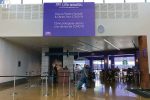Salk Institute

Tackling the COVID -19 Pandemic
One year into the coronavirus pandemic, vaccines are bringing hope to millions around the world. But reports of new viral variants of the SARS-CoV-2 coronavirus, which causes the COVID-19 infection, concern medical professionals. A fast, portable test developed by scientists at the Salk Institute and King Abdullah University of Science and Technology (KAUST) could help track the spread of new SARS-CoV-2 variants, as well as help healthcare workers distinguish between SARS-CoV-2 and other viruses, including influenza.
Salk Professor Juan Carlos Izpisua Belmonte, who helped develop the new test, called NIRVANA, says it does not require expensive infrastructure, like other approaches. “We can accomplish with one portable test the same thing that others are using two or three different tests, with different machines, to do.”
Today, the standard approach to learning whether a nasal swab is positive for COVID-19 is to run a polymerase chain reaction (PCR) test to detect genetic material from the SARS-CoV-2 virus. If the sample is negative, however, patients and clinicians do not get any information on what might be causing the COVID-like symptoms – unless they run separate PCR tests for other viruses, using different swab samples. And if the sample is positive for SARS-CoV-2, they do not learn which COVID-19 variant a patient is infected with, unless another set of tests is run, which requires a large and expensive gene-sequencing machine.
In 2020, Mo Li, an assistant professor of bioscience at KAUST, pondered how his expertise in genetic engineering and sequencing could help combat COVID-19. Li, who previously spent six years as a Salk postdoctoral researcher in the Izpisua Belmonte lab, wondered whether a gene-detection approach called isothermal recombinase polymerase amplification (RPA) coupled with real-time sequencing might be more useful – and faster, cheaper and more portable – than the current COVID-19 testing approach. He teamed up with Izpisua Belmonte to find out.
Unlike PCR, which cycles through lower and higher temperatures to separate DNA strands and copy them, RPA uses proteins – rather than temperature changes – to accomplish the same thing in only 20 minutes. The technology lets researchers copy longer stretches of DNA, and probe for multiple genes at the same time. The duo developed a small, portable device that can screen 96 samples at a time using the RPA assay. They call the method NIRVANA, for “Nanopore sequencing of Isothermal Rapid Viral Amplification for Near real-time Analysis.”
They designed NIRVANA to simultaneously test samples for COVID-19, influenza A, human adenovirus, and non-SARS-CoV-2 human coronavirus. In just 15 minutes, the device begins to report positive and negative results. And within three hours, the highly accurate device finalizes results on all 96 samples – including the sequences of five regions of SARS-CoV-2 that are particularly prone to accumulate mutations leading to new variants such as the B.1.1.7 variant identified in the UK. Izpisua Belmonte says market analysis will be required to determine the cost of commercialization. The test is the latest advance in Salk’s efforts to tackle the COVID-19 pandemic with innovative research projects on immunity, vaccine development, viral imaging and more.
Every cure has a starting point. The Salk Institute embodies Jonas Salk’s mission to dare to make dreams into reality. Its internationally renowned and award-winning scientists explore the very foundations of life, seeking new understandings in neuroscience, genetics, immunology, plant biology and more. The Institute is an independent nonprofit organization and architectural landmark: small by choice, intimate by nature and fearless in the face of any challenge. Be it cancer or Alzheimer’s, aging or diabetes, Salk is where cures begin.
Learn more at: www.salk.edu.





